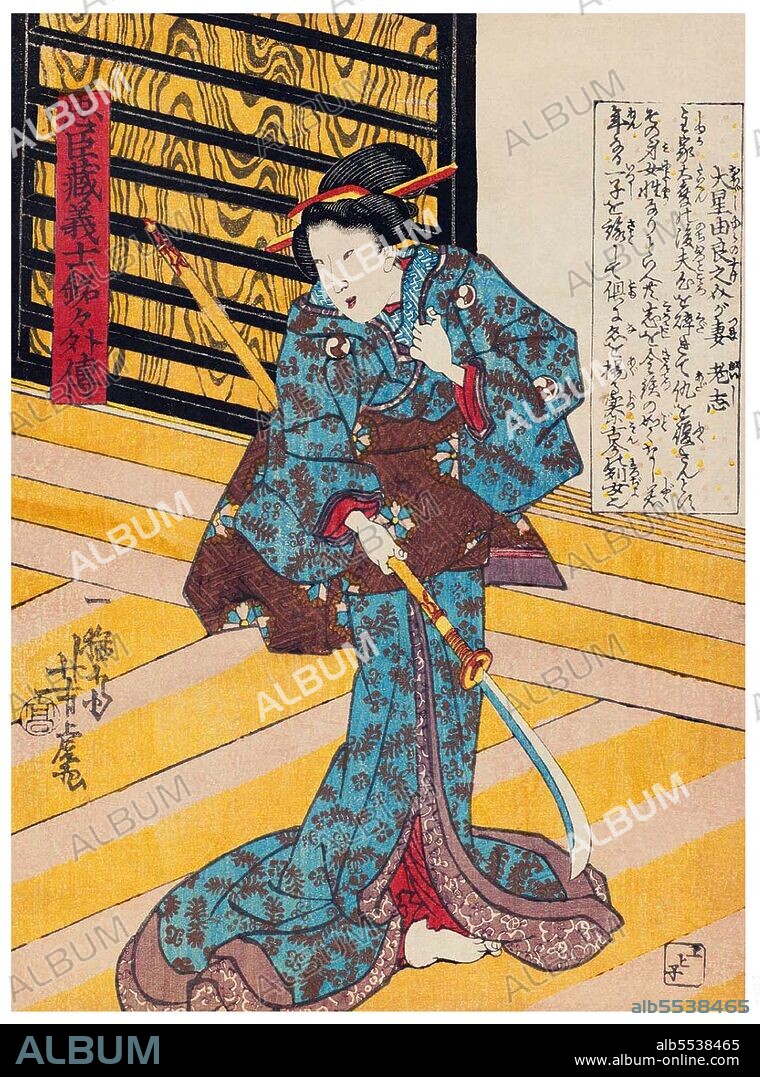alb5538465
Japan: Ishi-jo, the wife of Oboshi Yuranosuke Yoshio, leader of the 'Forty Seven Ronin', was an Onna-Bugeisha or female samurai. Utagawa Yoshitora (active c.1850-1880),1843-1847

|
Zu einem anderen Lightbox hinzufügen |
|
Zu einem anderen Lightbox hinzufügen |



Haben Sie bereits ein Konto? Anmelden
Sie haben kein Konto? Registrieren
Dieses Bild kaufen.
Nutzung auswählen:

Titel:
Japan: Ishi-jo, the wife of Oboshi Yuranosuke Yoshio, leader of the 'Forty Seven Ronin', was an Onna-Bugeisha or female samurai. Utagawa Yoshitora (active c.1850-1880),1843-1847
Untertitel:
Siehe automatische Übersetzung
Onna-Bugeisha or female samurai, formed a small section of the traditional Japanese upper class. Many wives, widows, daughters, and rebels answered the call of duty by engaging in battle, commonly alongside samurai men. They were members of the bushi (samurai) class in feudal Japan and were trained in the use of weapons to protect their household, family, and honor in times of war. They also represented a divergence from the traditional 'housewife' role of the Japanese woman. Consisting of the female word onna (woman) and the masculine bugeisha (warrior), the term creates a misnomer, which can be quite controversial. Nevertheless, onna bugeisha were very important people in ancient Japan. Significant icons such as Empress Jingu, Tomoe Gozen, Nakano Takeko, and Hojo Masako were all onna bugeisha who impacted Japan, shaping it into the country it is today.
Bildnachweis:
Album / Pictures From History/Universal Images Group
Freigaben (Releases):
Model: Nein - Eigentum: Nein
Rechtefragen?
Rechtefragen?
Bildgröße:
3600 x 4851 px | 50.0 MB
Druckgröße:
30.5 x 41.1 cm | 12.0 x 16.2 in (300 dpi)
Schlüsselwörter:
ASIEN • ASIEN, KONTINENT • FRAU • FRAUEN • GESCHICHTE • JAPAN • JAPANER • JAPANERIN • JAPANISCH • KONTINENT, ASIEN • KRIEGER • ORMNAMENT: JAPANISCH • RECKE (HELD) • SAMURAI (VOELKERKUNDE) • SAMURAI (VÖLKERKUNDE) • UTAGAWA YOSHITORA • WEIBCHEN • WOMAN • ZEITGESCHICHTE
 Pinterest
Pinterest Twitter
Twitter Facebook
Facebook Link kopieren
Link kopieren Email
Email
